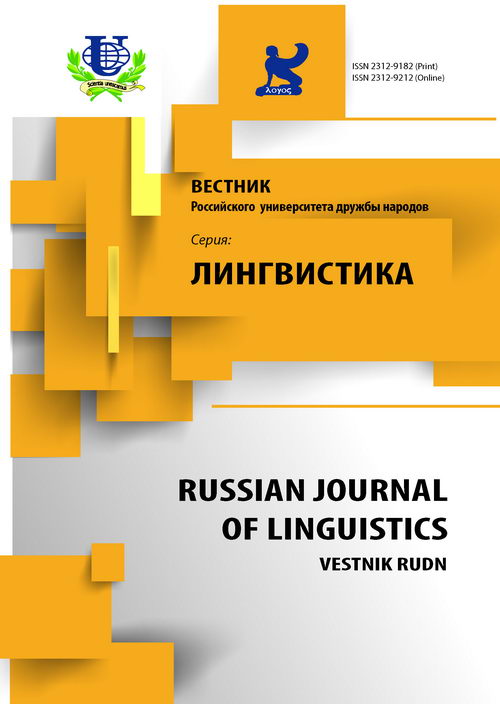Lexical Structure in American Youth Slang: A Study
- Authors: Tambovtseva KD1
-
Affiliations:
- Peoples’ Friendship University of Russia
- Issue: No 2 (2015)
- Pages: 60-69
- Section: Articles
- URL: https://journals.rudn.ru/linguistics/article/view/9349
- ID: 9349
Cite item
Full Text
Abstract
This article analyzes the methods of word formation in slangs used by the American youth. The relevance of the study is justified by a large interest to examine the ways of word formation in non-standard vocabulary and the sociolinguistic factors influencing this process. The aim of the study is to determine the most common methods of word formation among the American youth in their use of slang, i.e. to identify the sources of slangisms, characterize and support them by proper examples, analyze them and generate an appropriate classification. The slang expressions are taken from movie scripts of modern American cinema for the young. A sample of about 1000 units served as data for this study. The authors use standard methods of data collection, observation of the subjects - native speakers of American English-, data classification and comparative analysis of the collected material. This article would be useful for researchers working in the field of colloquial vocabulary and social dialects, word-formation processes in language, for socio-linguists and teachers of English. The result of this research has been fruitful: based on slangisms collected from the scripts of modern American movies, the authors were able to classify methods of formation of American youth slang, describe them on the basis of empirical data and provide relevant examples.
Keywords
About the authors
K D Tambovtseva
Peoples’ Friendship University of Russia
Email: likeadventure@rambler.ru
Department of Foreign Languages Philology Faculty
References
- Алексеев Д.И. Аббревиатуры как новый тип слов // Развитие словообразования современного русского языка. М., 2006.
- Антрушина Г.Б., Афанасьева О.В., Морозова Н.Н. Лексикология английского языка. М.: Дрофа, 2000.
- Береговская Э.М. Молодежный сленг: формирование и функционирование // ВЯ. 1996. № 3. С. 32-41.
- Вилюман В.Г. О способах образования слов сленга в современном английском языке // ВЯ. 1960. № 6. С. 137-140.
- Волкова Н.А. Имя собственное и его производные в структуре молодежной жаргонной лексики и фразеологии // Мова і сучасність. Вісник Львівського у-ту. Серія: Філологія. Львів, 1990. Вип. 21. С. 30-40.
- Елисеева В.В. Лексикология английского языка. СПб.: СПбГУ, 2003.
- Мешков О.Д. Семантические аспекты словосложения английского языка. М., 1986.
- Миллер А.А. Основные пути формирования сленга // В кн.: Иностранный язык, Алма-Ата, 1971. Вып. 6.
- Ретинская Т.И. Источники и механизмы формирования французского студенческого арго: Канд. дис. М., 2004.
- Хомяков В.А. Введение в изучение сленга - основного компонента английского просторечия. М.: URSS, 2009.
- American Slang. Edit. By Robert L. Chapman. N.Y., 2001.
- Cohen G.L. Studies in Slang. Frankfurt am Main: Land, 1985.
- Partridge E.S. Slang Today and Yesterday. London, 1979.
- Partridge E.S. Slang // Usage and abusage: A guide to good English. London, 1964.
- Арапов М.В. Сленг // Большой энциклопедический словарь. Языкознание / Гл. ред. В.Н. Ярцева. М., 1998.
- Матюшенков В.С. Словарь английского сленга. Особенности употребления сленга в Северной Америке, Великобритании и Австралии. М., 2002.
- Никитина Т.Г. Молодежный сленг: толковый словарь. М., 2004.
- Хэмп. Э. Словарь американской лингвистической терминологии. М.: Прогресс, 1964.
- American Heritage Dictionary 4. URL: http://www.yourdictionary.com/diction1.html.
- Dictionary of American Slang and Colloquial Expressions by Spears R.D. Lincolnwood, Illinois, USA, 1991; M., 1991.
- Franklyn J.A. Dictionary of Rhysmic Slang. London, 1969.
- The Macmillan Dictionary of Contemporary Slang / Ed. by J. Green. London, 1995.
- Webster’s New World Dictionary of Computer Terms (seventh edition). By Bryan, Phd. Pfaffenberger. London, 1999.
Supplementary files















